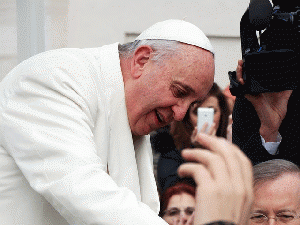Reprinted from Campaign For America's Future
Pope Francis' first visit to the United States begins with his arrival in Washington D.C. on Tuesday afternoon. From the nation's capital he goes to its economic capital, New York City, before concluding his trip with a visit to the nation's birthplace in Philadelphia.
That itinerary seems to suit the Pope's message: that political institutions must respond to the needs of the people, that the economy is a tool for human betterment rather than an end in itself, and that it is just as possible to remake society today as it was when this country was founded.
You don't have to agree with all of the Catholic Church's doctrines to recognize that the Pope's message has a timeliness and urgency. New data underscores his call to reduce economic inequality. The ongoing deaths of African Americans in police confrontations highlight his message of social justice. And the planet itself is in peril.
The Pope said this in Bolivia earlier this year:
"Let us say no to an economy of exclusion and inequality, where money rules, rather than service. That economy kills. That economy excludes. That economy destroys Mother Earth."
Francis was addressing the second World Meeting of the Popular Movements, a gathering of grassroots organizations and popular movements jointly hosted by the Church and the government of Bolivian President Evo Morales.
The "economy of exclusion and inequality" carries tragic consequences for the Third World, but its effects can be seen in this country as well. As the Census Bureau reported last week, the median household income in this country fell by 1.5 percent last year, a figure which averages out to $805 per household. While that decrease is not considered statistically significant, it means that, as Neil Irwin notes in the New York Times, "the median American household in 2014 had a lower income, in inflation-adjusted terms, than it did in 2013."
The median income was 6.5 percent below its 2007 level, before the onset of the Wall Street-generated financial crisis, and 2.3 percent below its 2009 level. Official unemployment figures have improved. But labor-force participation, an important measure of the job market, is the lowest it's been in decades -- even for working-age Americans. Meanwhile our nation's level of economic inequality remains "extremely high."
Given the Pope's urgent call to help the poor, it's important to note that U.S. poverty rates did not decline over the past year. Nearly 47 million Americans -- 14.8 percent of the population -- are poor, and that's according to standards which many people believe understate the problem. (The Census Bureau's "Supplemental Poverty Measure" puts the percentage at 15.3 percent.) More than 20 million people in this country earn less than half the income at which a household is considered impoverished.
The Pope's anti-poverty message holds special poignancy when we consider the youngest among us. Two out of five American children will experience at least one year of poverty during their lifetime, according to a new study, including 75 percent of African American children and 30 percent of white children.
The Pope said this in Bolivia: "A just economy must create the conditions for everyone to be able to enjoy a childhood without want, to develop their talents when young, to work with full rights during their active years and to enjoy a dignified retirement as they grow older."
That sounds like a progressive agenda: "A childhood without want" requires an end to poverty. Free higher education is needed if all young people are to "develop their talents when young." It will take full employment -- and workplace democracy -- to allow Americans to "work with full rights." And Social Security must be defended and expanded if we are to "enjoy a dignified retirement."
The Pope's moral teachings are equally forceful when it comes to international economics. He has condemned the "new colonialism" which, he says, sometimes appears as "the anonymous influence of mammon: corporations, loan agencies, certain 'free trade' treaties, and the imposition of measures of 'austerity' which always tighten the belt of workers and the poor."
It's highly unlikely that he supports the Trans-Pacific Partnership.
"... an economy of exclusion and inequality, where money rules..."
(Note: You can view every article as one long page if you sign up as an Advocate Member, or higher).






